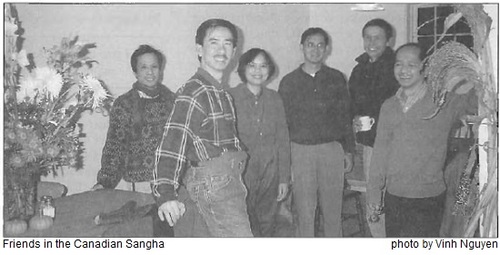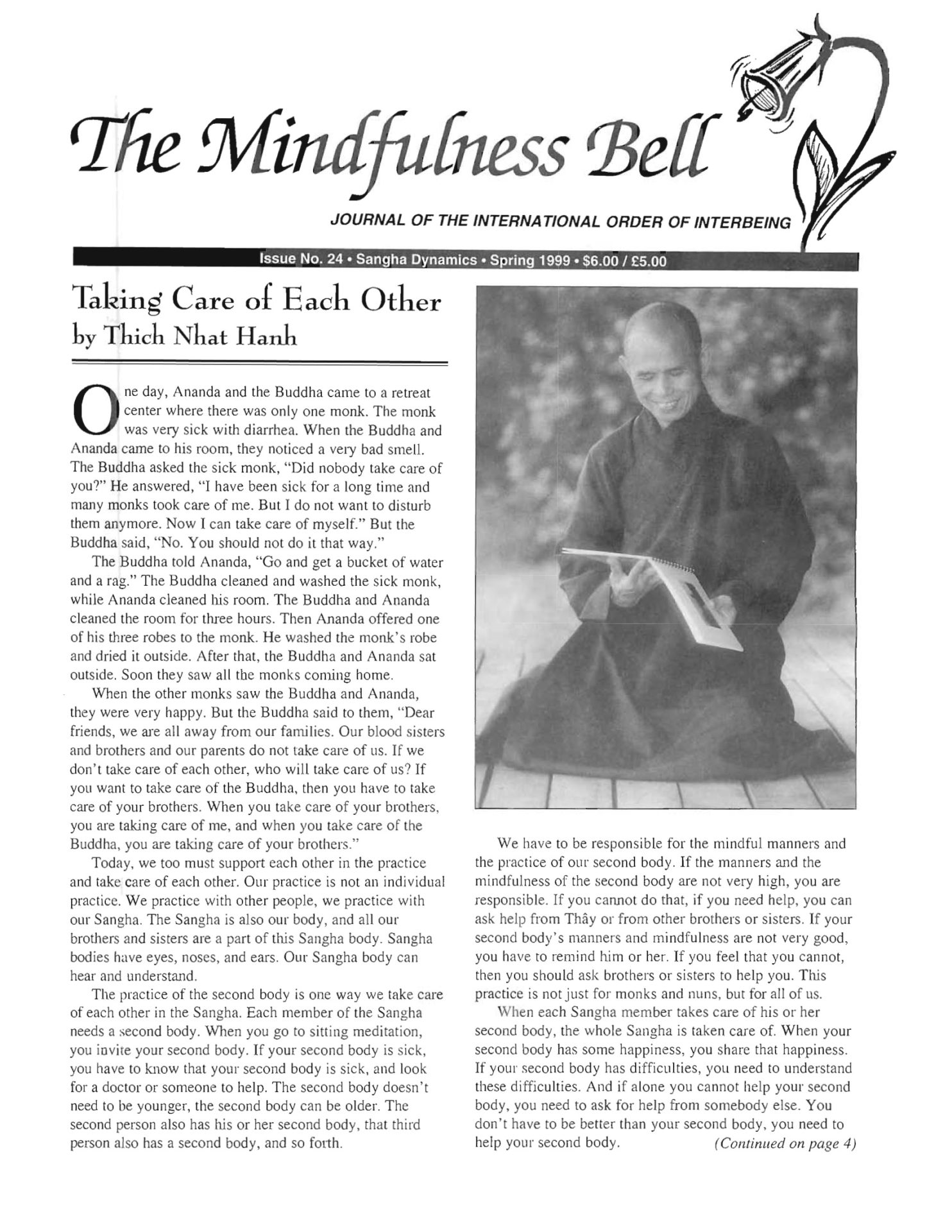By Nguyen Duy Vinh
When we receive the Mindfulness Trainings and vow to take refuge in the Three Jewels, we commit to take care of ourselves and bring joy and happiness to others. The precepts constitute our ideals and the basis of our mindfulness practice. Taking refuge in the Three Jewels-the Buddha, the Dharma, and the Sangha-we know that these commitments cannot be accomplished without a good teacher, a true teaching, and supportive friends-a Sangha. The Sangha is essential, for without it, our practice will slowly fade away. Thay has compared nuns and monks who leave their Sangha to tigers that abandon the forest and are soon caught by hunters.
By Nguyen Duy Vinh
When we receive the Mindfulness Trainings and vow to take refuge in the Three Jewels, we commit to take care of ourselves and bring joy and happiness to others. The precepts constitute our ideals and the basis of our mindfulness practice. Taking refuge in the Three Jewels-the Buddha, the Dharma, and the Sangha-we know that these commitments cannot be accomplished without a good teacher, a true teaching, and supportive friends-a Sangha. The Sangha is essential, for without it, our practice will slowly fade away. Thay has compared nuns and monks who leave their Sangha to tigers that abandon the forest and are soon caught by hunters. Without a Sangha, lay practitioners too will be caught by the traps of our environment and our habit energy. But, building and maintaining a Sangha can be challenging. To succeed, you need committed people and, in the long run, companionship, camaraderie, and solidarity.

Throughout the years, I have had many memorable encounters with the members of our Sangha, which strengthened our relationships. In November 1997, several brothers and sisters from Ottawa and Montreal traveled to Vermont to meet Thay and attend the inauguration ceremony of Green Mountain Dharma Center. Before we left Ottawa, we listened carefully to weather forecasts of snow and wind, but it didn't sound too bad. By the time we were out of Montreal, however, a blizzard had started and driving became very difficult. It took a tiring five-and-a-half hours to reach Woodstock, Vermont, normally a two hour trip. When we arrived, we discovered that Thay's talk had been canceled due to the storm. Fortunately, we had a cellular phone and called for directions to Green Mountain Dharma Center. But, driving up the steep, slippery road, we were forced to abandon our cars and walk. After 45 minutes, we were lost and exhausted. We phoned again, and learned we were almost there. Ten minutes later, we saw a huge barn with light inside. We arrived very late and tired, but joyful. We also found that through our hardship, our solidarity and friendship was strengthened.
Small things can serve to bind us together as well. I recall when our sister Brenda Carr invited the Sangha to a formal recitation of the Five Mindfulness Trainings at her home. After a very difficult childbirth, Brenda had been ill for some time. That evening, I was particularly moved to see Brenda put on her brown Order of Interbeing coat for the first time. (The coat was a kind gift from the Toronto Vietnamese Sangha.) The recitation that night was vibrant with sincerity and commitment. And we eleven practitioners were honored by Andre and Brenda's beautiful six-month-old daughter, Karuna.
I recall also the sorrow our Sangha experienced late last December, when our sister Annette Pypops passed away after two years of fierce struggle against breast cancer. Strengthened by Montreal's Maple Village Sangha, we organized a chanting and prayer ceremony for Annette, answering the wish she expressed before she died.
All these moments of joy, hardship, and sadness bring us together, allow us to know each other a bit more, and enhance the solidarity and friendship within the Sangha. The Buddha himself taught that such friendship and solidarity is very important. Once, the Buddha found a sick monk, who was left alone while the other monks went on almsrounds. After caring for the unwell monk, the Buddha instructed the returning monks: "Friends, if we do not look after each other, who will look after us? When you look after each other, you are looking after the Tathagata."
In applying the Buddha's teaching to Sangha building, we often find our primary difficulty in enhancing Sangha relationships is tied to how each of us organizes his or her own life. We are busy with professional and family life. Most of us spend eight to ten hours a day working to earn our bread and butter. In current Western society, it is not easy to work part-time, unless we have a liberal profession or our needs allow us to live simply. The struggle is even more difficult when we have a family to support, especially with young adults of university age. But, we must find time to take care of our Sangha friends who are in difficult moments- illness, accident, lost of beloved ones, job loss, etc. A Sangha's success depends on its members sharing time, energy, and material resources with each other. The well-being of our Sangha affects our own well-being and vice-versa.
Dharma teacher Nguyen Duy Vinh, True Awakening (Chan Ngo), practices with the Ottawa Sangha in Ottawa, Ontario and with Maple Village in Quebec.


